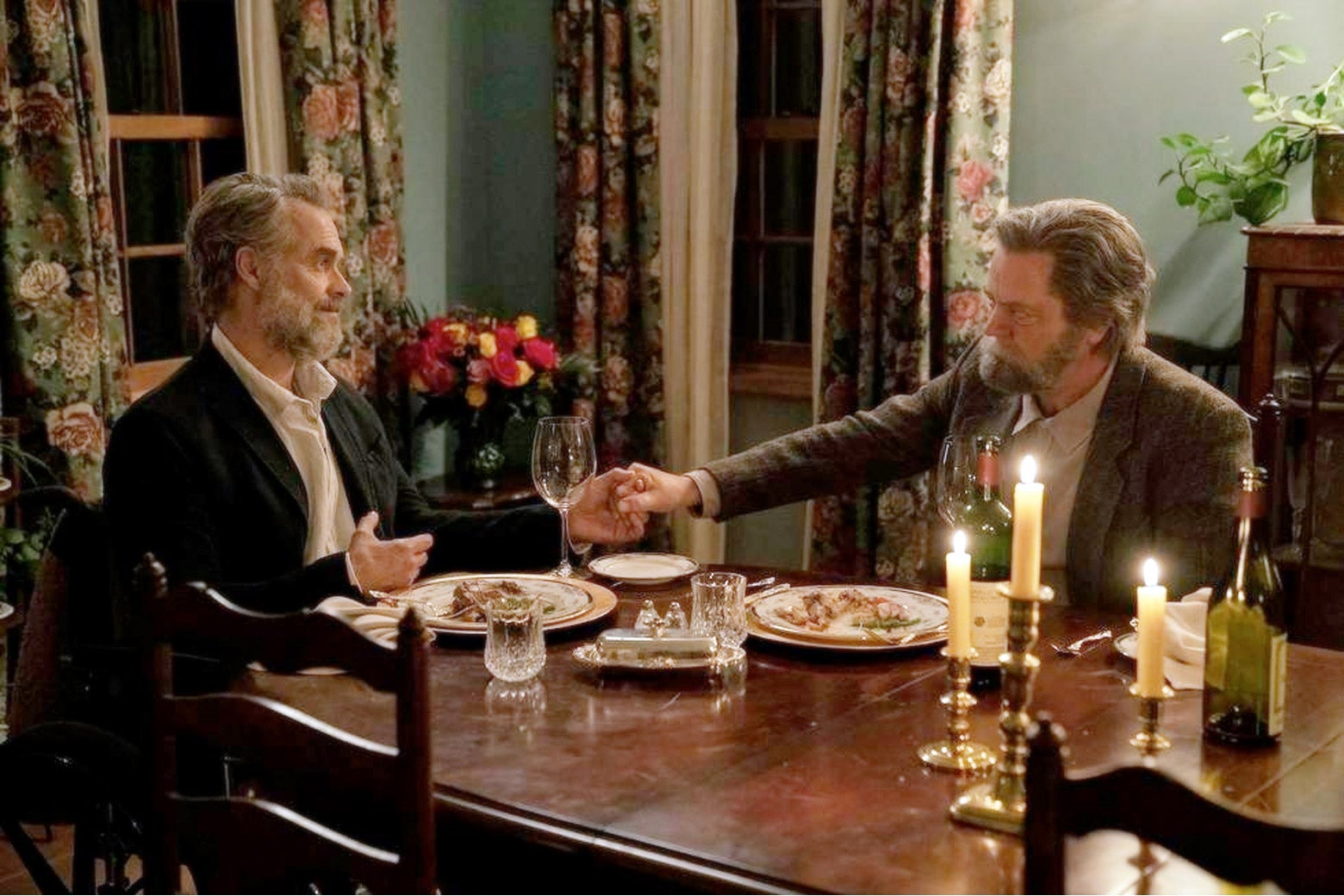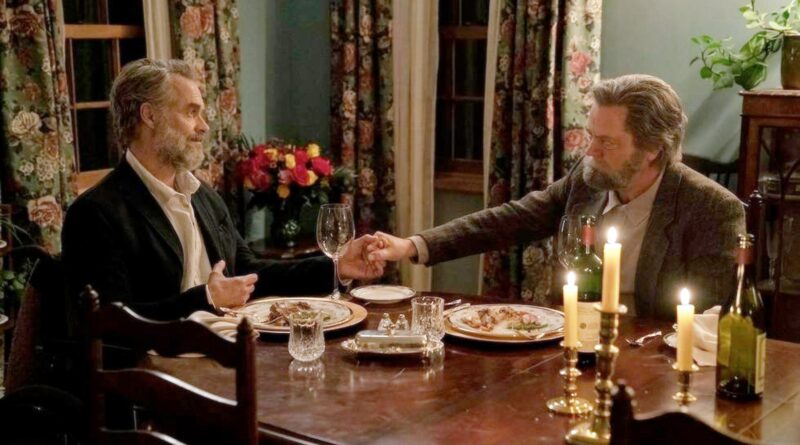The Last of Us Episode 3 is a perfect queer love story. – Slate

This article contains spoilers for The Last of Us, Episode 3.
Sunday’s episode of The Last of Us, titled “Long, Long Time,” could have been very different. As the third installment of HBO’s hot new show about an Earth overrun by a mutated, zombifying fungus, it seemed sure to focus on advancing the central narrative of young, apparently plague-proof Ellie, and Joel, her begrudging protector, as they journey from Boston west toward a lab working on a cure—a trek that had only really gotten underway (with a bang and a few hundred whimpers) at the end of Episode 2. What we got instead was a capsule episode, and a particularly bracing one, given the show’s oppressively bleak mood thus far: The hour is dedicated to the love story of Bill and Frank, a gay couple who—due initially to Bill’s skills as a bunker-stocking, booby-trapping, Don’t Tread on Me survivalist—manage to build a largely happy existence together in an abandoned and eventually fortified rural hamlet for almost 20 years.
Advertisement
Advertisement
Advertisement
Advertisement
The tale of Bill and Frank, as depicted through award-worthy performances from Nick Offerman and Murray Bartlett, has garnered almost uniform praise for its moving writing and elegant pacing. We see flashes of the pair’s life every few years, from when they meet at Bill’s perimeter fence in 2007, to fights and dinners and raider attacks, to when they finally die together in 2023, with nary a tendril in sight. It’s worth noting that this, too, could have been very different. In the video game on which The Last of Us is based, Bill and Frank exist, but Bill is apparently a much worse version of Offerman’s misanthropic prepper—so awful, in fact, that Frank has already met his end trying to flee the compound in frustration by the time Joel and Ellie arrive.
Advertisement
Advertisement
Why the change? In the after-show segment for the episode, Neil Druckmann, the series’ co-creator and the creative director of the video games on which it is based, explained: “My philosophy on this show has always been, when should we deviate, and when should we come back? If it’s kinda the same, or worse, we stay where the game is. If it’s better? We deviate.”
Advertisement
I haven’t played the game (nor any since the original Crash Bandicoot), but I will go out on a limb and say: Yeah, this version of Bill and Frank is better—and better in ways that I doubt Druckmann and his team could have anticipated. Of course, the device of compressing the entire life of a couple into a few snapshots is going to jerk some tears (remember Up?), and scoring it with Max Richter’s “On the Nature of Daylight” is all but guaranteed to turn that trickle into a flood, but that’s not what I’m talking about. With Bill and Frank, we were given a portrait of love—specifically gay love—that feels surprising and urgent. And it’s a gift that could not have arrived at a better moment.
Advertisement
Advertisement
Advertisement
In our own 2023, we are not exactly lacking for media images of white gay men. But Bill and Frank’s love story didn’t just feel like easy representation for the purpose of checking boxes or amassing clout. It felt lived-in, achingly familiar, and pointed—like we were being allowed this brief 16-year detour, this reprieve from the horror, for a reason. So what did we see?
Advertisement
Advertisement
For one thing, we see gay desire portrayed in all its complexity, but with a touch as light as a breeze playing through curtains. Once Bill lets his (armed) guard down and allows Frank into the house for a meal, the fact that he might be attracted to him emerges gently, through Bill’s lingering glance at the bathroom door behind which Frank is showering, or when he sheepishly pushes his hair back and smiles ever-so-slightly under that bushy beard after Frank expresses approval of the wine he’s chosen to accompany a freshly caught rabbit. “I know I don’t seem like the type,” Bill gruffly admits. “No, you do,” Frank responds. Bill’s is not a “type” of gay man I can say I’ve ever seen in mainstream media before, and watching him slowly reveal and deepen that aspect of himself with Frank’s help—sexually, yes (Hollywood: more hairy bear love scenes please!), but expressively and culturally as well—is thrilling. The shared bottle of Beaujolais and the bars of Linda Ronstadt that Bill sings at the piano are as important as anything to do with their bodies.
Advertisement
Advertisement
While the romance we witness is charming, the episode insists we notice how the couple interacts with their little patch of dirt as well. The world of The Last of Us that we’ve been shown up to this point is marked by blight and ruin, military dictatorship and weak rebellion. But Bill and Frank create something else, a little oasis of their own that’s recognizably gay, full of quiet beauty and joys the size of new strawberries. Their first argument is over aesthetics. Frank wants to fix up the block and some of the “not stupid” shops—the wine and furniture stores, the clothing boutique—because he hopes they might one day have uninfected guests (which they eventually do, in the form of Joel and Tess), but really because making things nice, especially when niceness isn’t valued, is one of the great gay callings. When Bill huffs over the resources all this zhushing will take, Frank makes an eloquent case: “Paying attention to things … it’s how we show love.” That’s a we I’m proud to share.
Advertisement
Advertisement
Advertisement
You might point out, rightly, that the soft-focus pleasures that Bill and Frank cultivate as the years go on are the result of privilege—specifically the obvious wealth Bill had to have possessed before the outbreak to set him, and then Frank, up for self-sufficiency afterward. I think the show wants us to sit with this discomfort; after all, the Black mother and baby whose skulls we see dumped in a mass grave were Bill’s neighbors before they were force-marched out of their apartment while he hid in his bunker.
But after a fall this precipitous, redistribution of resources is pretty much meaningless—“There are no friends to be had,” as Bill puts it—and I’d argue that Bill, under the loving influence of Frank, finds his way to something like redemption, of a very queer sort. By the end of their story, these men have transformed their lives and their small domain into a kind of artwork, a site-specific installation on the themes of human creativity, sensuality, and love in the midst of rubble and rot. This is their achievement. This strange, absurd, wasteful, astonishing project—making more beauty in a world consumed by ugliness—is what they have spent their resources and energy and years on this benighted planet doing. And when age and humdrum disease brings their ability to create and curate together to an end—when Frank can no longer paint, and Bill winces as he gardens or carries his exquisitely composed plates in from the kitchen—they decide that it’s time for the exhibition to close.
Advertisement
Advertisement
Advertisement
I have watched Bill and Frank’s final day a number of times now, and I have to agree with Bill: It is so, so much more than the “tragic suicide at the end of the play.” As a piece of television writing, its grace arises from its queer sense of scale: Marriage is treated as one more nice activity during a nice day, equal to remarking on the flowers, visiting the boutique, or enjoying a piece of toast: all of these fine, lovely things to do before one takes one’s leave. As an echo of the gay experience with AIDS, it is, as veteran activist Peter Staley put it in a Facebook post, a fitting tribute to the “tender love & bravery gay men summoned when facing death during the plague years, including those who did so on their own terms.”
Advertisement
Advertisement
Advertisement
And then there’s the leave-taking itself. After we watched the episode together Sunday evening, one of my partners observed that so much of apocalyptic fantasy is not actually concerned with death, but with immortality, with surviving past the catastrophe no matter what. This usually means having children (somehow), or otherwise “saving the race” or “repopulating the Earth.” It may be that The Last of Us will eventually follow Ellie down this familiar, questionable path. But Bill and Frank make a path of their own. The end of Frank means the end, period, because for this couple, it was their making of the now that mattered, rather than simply making it to some hazy future. Procreation, in this economy? Nah. Co-creation—that’s a much smarter way to spend your time, until your time is up.
Advertisement
The late queer theorist José Esteban Muñoz famously wrote that queerness “allows us to see and feel beyond the quagmire of the present. The here and now is a prison house.” “We must dream and enact new and better pleasures, other ways of being in the world, and ultimately new worlds,” he added. “Queerness is essentially about the rejection of a here and now and an insistence on potentiality for another world.”
Bill and Frank found each other amid one of the worst quagmires imaginable, and yet, instead of succumbing to its fearful logic, they pursued pleasure, sought another way of being in their world. They rejected the pestilence—only partially fungal—spreading all around them and thrived by chasing, in the smallest of actions, the queer potentiality for more, for better than this, that Muñoz recognizes. This, I think, is why, at the very end of their lives, after a final sip of pill-spiked Beaujolais, they smile and chuckle at each other before heading off to bed. Suicide may seem like a surrender, but then, they’ve been evading the prison house of the now for years. By resisting the guards through the queerness of their daily lives, they’ve long since won the fight.
Advertisement
Advertisement
Advertisement
Advertisement
This brings me to the “urgent” part I mentioned earlier, about why this episode arrives at an opportune moment. Right now, in the real world, queer people—most prominently the trans and gender-diverse among us—find ourselves in a dangerous quagmire of our own. According to many on the right, we are the fungus spreading through society, our tendrils of “gender ideology” and sexual deviance infecting and “grooming” children so that we might create more like ourselves. Like any such infection, we should be stamped out—definitely ripped from the public square, ideally eradicated from existence entirely. How powerful, then, to see not only a gay couple given an entire hour of a marquee show, but a gay couple who are held up as the keepers of civilization, as stewards of beauty, as emblems of human dignity and possibility. As furry, affectionate reminders that queers, whatever our circumstances, can flourish, fight, and win. As maybe not the last of us, but certainly the best.
